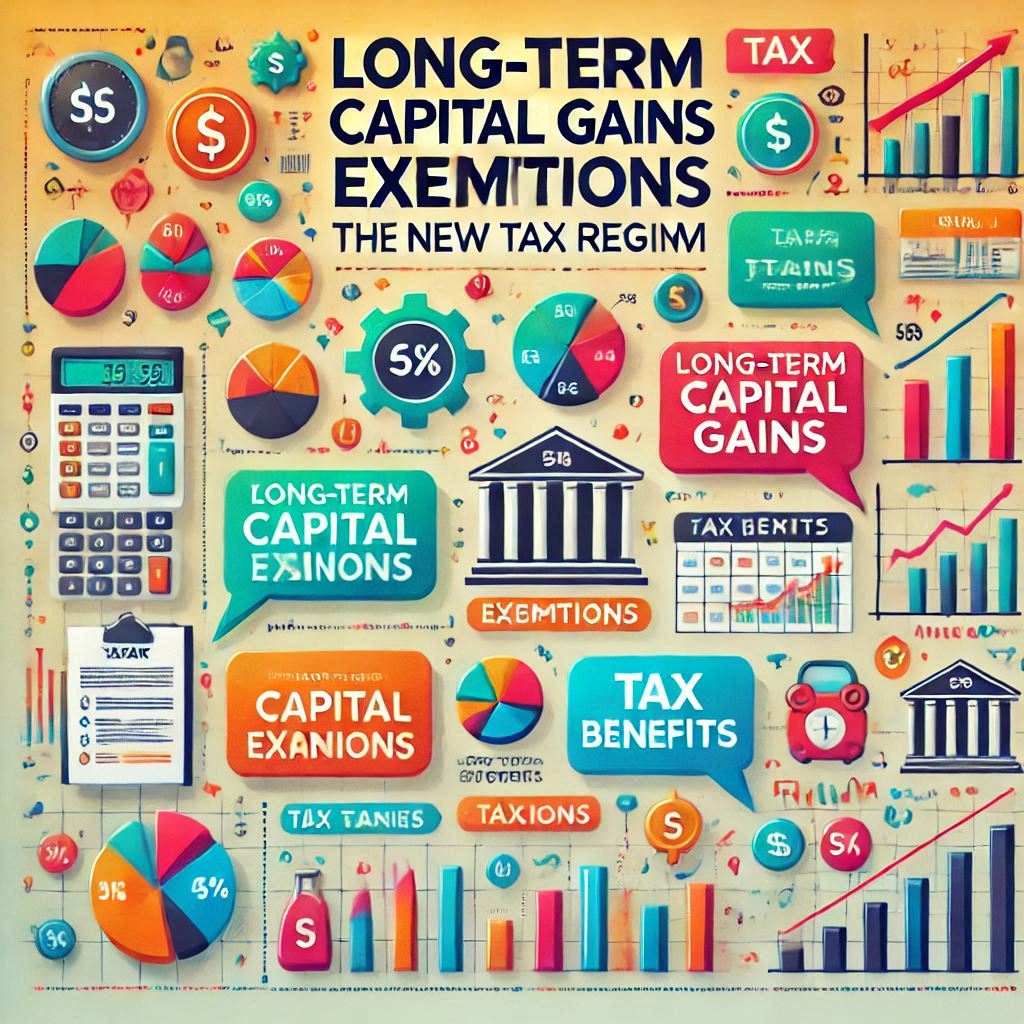LTCG Exemptions Under the New Tax Regime

Quick Overview
The Union Budget 2024 has introduced significant changes to the tax regime concerning Long-Term Capital Gains (LTCG) and Short-Term Capital Gains (STCG). Notably, the exemption limit for LTCG on equity-related assets has been increased, and the holding periods for these assets have been revised. The new tax provisions aim to streamline the tax system and enhance compliance.
Key Points
- LTCG Exemptions: Under Section 112A, individuals can now claim an exemption of up to Rs 1.25 lakh on LTCG from eligible equity assets held for over one year.
- Changes in Tax Rates: The tax rate for LTCG has been adjusted to a flat 12.5%, while STCG for equity investments has increased to 20%.
- Revised Holding Periods: The holding period for long-term capital assets has been simplified to either 12 months for listed securities or 24 months for other assets, replacing the previous 36-month requirement.
- Grandfathering Provisions: Assets acquired before January 31, 2018, retain certain benefits when sold after February 1, 2018.
- Implementation Date: The new provisions will take effect from July 23, 2024, for any transfers made after this date.
Detailed Breakdown
1. LTCG Exemption Under Section 112A
The Union Budget 2024 maintains the exemption for Long-Term Capital Gains (LTCG) under Section 112A, allowing taxpayers to exempt up to Rs 1.25 lakh per financial year on eligible equity-related assets. This exemption applies to:
- Eligible Assets: Equity shares, units of equity-oriented mutual funds, and units of business trusts.
- Holding Requirement: The assets must be held for more than one year to qualify as long-term capital assets.
- Securities Transaction Tax (STT): Both the purchase and sale of equity shares must be subject to STT, while only the sale of mutual fund units or business trusts needs to comply.
2. Changes in Tax Rates
The tax rates for capital gains have undergone notable changes:
- Long-Term Capital Gains (LTCG): Taxed at a flat rate of 12.5%.
- Short-Term Capital Gains (STCG): Increased to 20% for equity investments, up from the previous 15%. For other assets, the STCG will be taxed based on the taxpayer’s applicable income tax slab rate.
3. Revised Holding Periods
The new budget has simplified the holding periods for determining long-term capital assets:
- Listed Securities: The holding period has been reduced from 36 months to 12 months.
- Other Assets: The holding period for assets other than listed securities has been set at 24 months. This change is aimed at making the tax system more straightforward and accessible for investors.
4. Grandfathering Provisions
The budget retains grandfathering provisions for capital assets acquired before January 31, 2018. This means that if these assets are sold after February 1, 2018, they may still qualify for certain tax benefits, providing a layer of protection for earlier investments.
5. Implementation Date
The new provisions regarding LTCG and STCG will come into force on July 23, 2024. Any transfer of capital assets made on or after this date will be subject to the new tax rates and holding periods.
Important Details & Evidence
- Exemption Increase: The exemption limit for LTCG on equity-related assets has increased from Rs 1 lakh to Rs 1.25 lakh, allowing taxpayers to retain more gains without incurring tax.
- Standardization of Holding Periods: The reduction of the holding period for listed securities to just 12 months means that investors can benefit from lower tax rates sooner, which may encourage more investment in equity markets.
- Impact of STT: The requirement for STT on equity transactions ensures that the government can track transactions more effectively, promoting compliance and transparency in the tax system.
Final Takeaways
The changes introduced in the Union Budget 2024 represent a significant shift in how long-term and short-term capital gains are taxed in India. The increase in the LTCG exemption limit and the simplification of holding periods are designed to encourage investment in equity markets while ensuring that the tax system remains efficient and compliant.
Investors should take note of these changes, particularly the new effective dates and the requirements for exemptions under Section 112A. Understanding these provisions will be crucial for effective tax planning and maximizing investment returns in the coming financial years.